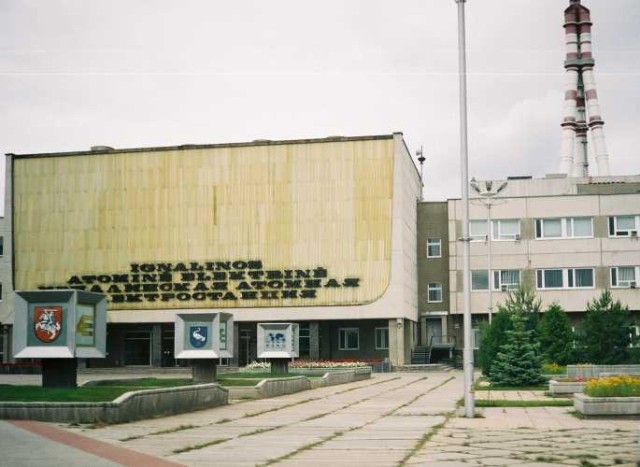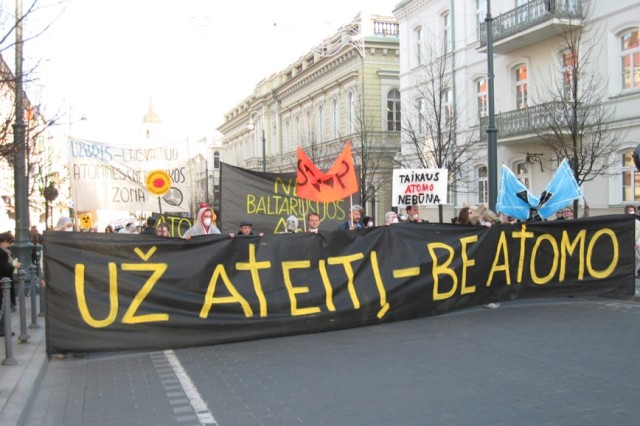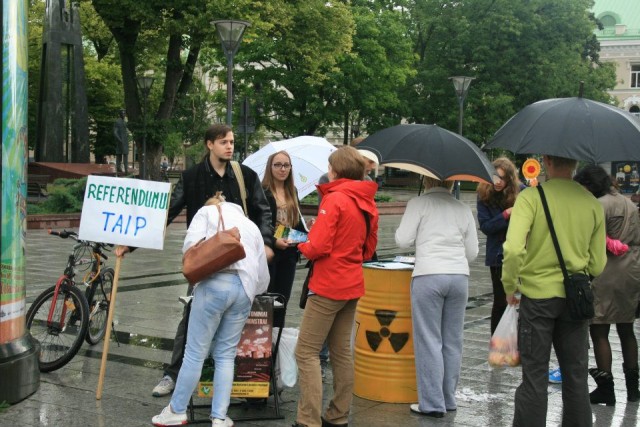
Court decision puts Norway on the hook for massive CO₂ Storage build-out
A ruling by the European Free Trade Association Court that Norway’s continental shelf falls under the European Economic Area Agreement could dramatic...
News

Publish date: April 14, 2014
Written by: Andrei Ozharovsky
News
VILNIUS—As the Lithuanian government has it, Russia’s halting its Baltic Nuclear Power Plant project in Kaliningrad Region is a result of Moscow’s failure to secure prospects of exporting the station’s energy and synchronizing the regional grid with that of Europe, but, says Vilnius, Lithuania – where politicians, against public disapproval, still have their sights set on a new reactor in Visaginas – should be able to avoid making the same mistakes.
Kaliningrad Region “has no link connecting its power lines with Poland, and no guarantees that they will be able to deliver electric power to Lithuania [and] other countries, and building such a powerful site and producing energy in a situation where it can’t be sold to anyone would, I think, be a huge risk for [Russia],” Lithuanian Prime Minister Algirdas Butkevičius said in early April in a conversation with the national radio station LRT, the Baltic portal DELFI reported (in Russian).
Butkevičius said that “anyone familiar with the energy system that exists in Kaliningrad Region understands that after building a [nuclear power plant] they will have to install power lines to provide for transport of electric power to other countries.” And there is, Butkevičius added, another problem still in Kaliningrad Region’s energy system: “according to my information, […] they need to upgrade the domestic power lines as well, since these are worn out,” the prime minister said.
Russia’s project of a nuclear power plant (NPP) in Kaliningrad Region – a Russian territory bordered by the Baltic Sea in the west, Lithuania in the north and east, and Poland in the south, with Belarus lying further to the east – was aimed from the start at selling energy for export to neighboring states: The amount of power that the future Baltic NPP would produce – two units equipped with VVER-1200 reactors to a combined capacity of 2,300 megawatts – is well in excess of the region’s own needs. According to a late March report by the Russian daily Kommersant (in Russian), the region’s peak demand is 827 megawatts.
But all attempts by Russia to land power delivery contracts with potential customers in the European Union – first and foremost, Lithuania and Poland – fell flat, much like the Russian State Atomic Energy Corporation Rosatom’s negotiations to secure investment funds or loans from energy and banking heavyweights in Europe.
Late last May, news reports broke saying that work at the site in Kaliningrad’s Neman District, where construction started in 2010, had been halted, and that Rosatom was considering an alternative option of building small- and medium-capacity reactors at the site. In an extensive interview given to the popular radio station Ekho Moskvy last June Rosatom head Sergei Kiriyenko admitted the re-planning would cause construction to “definitely halt for a year to two years,” and, possibly, longer.
According to Lithuanian Prime Minister Butkevičius, Vilnius so far has no official confirmation of Russia’s decision to give up its project in Kaliningrad.
But, as the Kommersant reported in its late March story, a recent meeting held by Russian Deputy Prime Minister Arkady Dvorkovich to discuss energy supply to the enclave focused, among other issues, on energy delivery scenarios that could be put into play should Lithuania desynchronize its grid from the Russian energy system.
For now, Lithuania’s grid remains part of what is called the IPS/UPS system – a wide area synchronous transmission grid operating on some of the former Soviet territory and controlled by Russia. But the former USSR republic has been seeking integration into the European Union’s electricity market; its anticipated exit from the IPS/UPS system may pull the plug on cross-border power delivery to the Kaliningrad enclave.
According to the story in the Kommersant, which cites a source close to Rosatom, the nearest completion date for the Baltic NPP could come no earlier than 2019, taking the licensing stage into account – while a solution for power supply to Kaliningrad was needed already by 2016. In any case, the “smaller reactors” option did not make it on the short list of decisions examined at Dvorkovich’s meeting: The strategies under consideration involved beefing up coal and gas capacities in the region.
And last Thursday, a report by Kaliningrad.Ru (in Russian) said, a meeting chaired by Russia’s Prime Minister Dmitry Medvedev made the decision to develop the enclave’s energy system according to a “coal-and-gas scenario.” Kaliningrad Region Governor Nikolai Tsukanov told journalists that this scenario was going to be approved “now” and said he hoped its implementation would begin in 2014, the story said. As for the Baltic NPP, Tsukanov said that “[t]wo weeks ago Rosatom and I talked, and for now the plan is to continue. No one was planning to close the construction site or mothball it.” However, according to the governor, at Medvedev’s meeting, the fate of the future plant was not discussed.
The Baltic NPP fiasco is not stopping Lithuania
Still, the dim prospects of the failed competitor station across the border should not, Lithuanian politicians say, mean that Lithuania should abandon its own plans for an NPP in Visaginas, a project Vilnius has been talking about since 2009.
By building a new nuclear power plant in Visaginas Lithuania intends to make up for the shut-down capacities of Ignalina NPP, whose two reactors – the Soviet-built RBMK-1500s – were, in accordance with the terms of Lithuania’s accession to the European Union, taken offline in 2004 and 2009 and are currently being decommissioned. Lithuania has been in talks with its Baltic neighbors Latvia, Estonia, and Poland in hopes to secure their involvement in the project.
From Lithuania’s point of view, Russia’s decision to scrap the Baltic NPP project may mean an understanding on the part of the Russians that the Baltic countries will never build their own station in Visaginas, said former Lithuanian prime minister, now a management consultant, Aleksandras Abišala. In his opinion, Delfi reports (in Lithuanian), citing the Baltic news agency BNS, the Baltic NPP was from the start a political project with no economic prospects and one that Kaliningrad Region itself never needed, so it has long been evident that there cannot be any nuclear power plant in the Russian enclave.

“I think the project had two aims – exert pressure to stop the [Visaginas] station from being built and the Baltic countries from synchronizing their power grids with the European Union. […] it was clear already six months ago or more that the construction in Kaliningrad Region was being discontinued. This alarms me because it would seem to prove that the Russians understand that we’ve already given up on building our own station. There’s no other explanation to think of. Or it simply got dragged on for too long, and it became impossible to continue to invest money into a manifestation of some sort of activity. I think this should have no influence on a decision [regarding Visaginas],” Abišala said.
As for Lithuania’s project in Visaginas, according to the current prime minister Butkevičius, the government is yet to make its final decision, but the project is still under examination.
Questions similar to those that plagued the Kaliningrad project – the feasibility of synchronization with the European Union’s grids and securing generating reserves to switch onto, should the need arise – still have no answers. These were sought from Lithuania’s chosen strategic investor in the project, Japan’s Hitachi:
“We have now requested […] Hitachi to evaluate this reactor from the point of view of synchronization with the Western grids, the need for an interconnection with Poland, [and] our ability to provide ourselves with a power reserve. We have now formed a list of almost 80 questions,” the news portal 15min.lt quoted (in Lithuanian) Butkevičius as saying.
The Baltic Course reports, citing the prime minister, that the final decision on the Lithuanian NPP in Visaginas will only be possible after all the answers and calculations have been received from the consultants.
“Today we have nothing to build. When we […] learn about the price of the project, when we […] know the possibilities of synchronization with Western [grids], what reserves are needed […] if one reactor is shut down, and whether we can ensure these reserves, and when we […] know [the] approximate price for [the] generated electricity, then we will decide,” The Baltic Course quoted Butkevičius as saying.
Lithuanian politicians speak in support of the new NPP…
Meanwhile, on March 29, leaders of the parties sitting in the Lithuanian parliament, the Seimas, expressed their support for a new nuclear power plant in Visaginas. A document they signed, called the Agreement on the Strategic Guidelines of Lithuania’s Foreign, Security, and Defense Policies for 2014-2020, holds that the project must be implemented “as soon as possible”.
“The dependence of Lithuania’s electric power system on the post-Soviet IPS/UPS system and the predominance of import of electricity from this system are a real threat to Lithuania’s national security,” Kauno diena, citing BNS, quotes the document (in Lithuanian) as saying.
The project of a new nuclear power plant, the document states, must be implemented “in accordance [with] the terms and conditions of financing and participation improved in cooperation with partners in order to expand the autonomous and competitive basic capacities of generating electricity,” reads a translated quote provided in a BNS story published in the Lithuania Tribune.
“We reached substantial and even historic agreement and commitment to implement the Visaginas nuclear power plant project […] that brings clear political reasoning back to the project,” Lithuania’s former prime minister Andrius Kubilius told journalists at the parliament on March 31, according to the Lithuania Tribune-run report.
“If some of the regional partners refuse to participate in the project, we will have to search for new partners and different solutions. But we have to move forward. The regional crisis caused by Russia has shown us very clearly that expecting a future of dependence on Russian electricity imports is entirely unsafe and irresponsible,” Kubilius was quoted as saying, likely referring to the deepening Russian-Ukrainian crisis and the ripple effects it has set in motion. Kubilius now leads the conservative opposition party Homeland Union – Lithuanian Christian Democrats.

In his turn, Lithuanian Energy Minister Jaroslav Neverovič sees many possibilities for the realization of the Visaginas project and claims Lithuania has few alternative options to ensure its own competitive power production, Delfi reports (in Lithuanian).
“We are very seriously disposed to evaluate our own power production projects, including the nuclear power plant project. If agreements on the economic implementation of the project are reached with our partners, considering, especially, the agreement signed by the [parliament] parties on [March 29], then I think the chances for the project to be realized are very good,” Neverovič said in a March 31 broadcast on the TV channel Lietuvos rytas.
The energy minister confirmed that discussions were ongoing with the regional partners and the investor with regard to improving the project. He could not, however, give a direct statement on what the government’s principal position was on the Visaginas project. He also did not elaborate on when such a decision would be made. Earlier this year, Neverovič told journalists that the final decision regarding the construction of Visaginas NPP could be expected in the first six months of 2014, a BNS report carried by Delfi (in Russian) said.
The Visaginas NPP project was developed with participation of Japan’s Hitachi Corporation based on anticipated partnership with Latvia, Estonia, and Poland. Poland, however, long ago withdrew from the project and, a February report in The Economist says, is considering building its own reactors.
…against the will of their voters
In October 2012, over 62% of votes cast in a national advisory referendum, held alongside parliamentary elections, said “no” to building a new nuclear power plant in Lithuania.
Though stating that his party was not anti-nuclear and promising “not to take any hurried decisions,” Prime Minister Butkevičius was prompted to pledge the following month to “carry out [the people’s] wishes.” Butkevičius – whose Social Democratic party had won a majority in the October election and who became prime minister in December – also said the Seimas must as soon as possible rule the plan to build the NPP “null and void.”
And in December that year, the Seimas adopted a resolution proposing that the government develop a “a cost-optimal and consumer-friendly strategy for provision of electricity” taking into regard the results of the referendum.
Still, Vilnius is not giving up on its plans for Visaginas. The citizens’ stated will was called into question shortly after the results of the referendum were announced.
Lithuania’s then-Energy Minister Arvydas Sekmokas said (in Russian) that, “if one were to look at it from the political point of view, then the voice of the people is, of course, important,” but that “legal experts could interpret [the results] differently.”

And Lithuanian President Dalia Grybauskaitė, in December that year, even suggested in an interview that, though being very important, the public opinion expressed in the referendum “was shaped in what I see in a very irresponsible manner, as there was no information and plenty of propaganda of lobbyist interests. I can say people were being deceived.” In her State of the Nation Address last June, Grybauskaitė said the national referendum was “reduced to farce.”
The president also told BNS around that time that “without some modifications, the project is certainly buried,” but that perhaps Lithuania “could build one reactor with the Japanese, if there were political will and understanding that we need this.”
In a comment given to Bellona in early April, Linas Vainius, of the Lithuanian environmental organization Atgaja, said that “the referendum incurs explicit legal obligations, and decisions by the parliament should have followed which did not follow.”
“It is unbecoming of democratic parties and a democratic country of the European Union to negate and trample on a decision of their citizens that they expressed in a referendum. And this was a clear decision – ‘no’ to a new nuclear power plant,” Vainius said.
“As we see, the people’s representatives do not – or will not – understand and respect the will of the public. No wonder, given that the public is only remembered when the time comes to rise, with its help, to the height of power,” a statement by Lithuania’s environmental movement Association Žali.lt, published last October, said in response to the government’s continued attempts, over the year that had passed since the referendum, to push for the Visaginas construction.
“Those in power could gain back the respect of the public if they stopped listening to tall tales on the order of those told by [Belarusian President Alexander] Lukashenko and [Russian President Vladimir] Putin about the flourishing future of nuclear power, and if they stuck their heads from behind the dusty walls of the past, before the death knell is rung on this energy sector,” the statement read, referring to another nuclear project underway in the region – the two-unit Belarusian NPP, which is being built to a Rosatom-developed project near Ostrovets in Lithuania’s neighbor Belarus, close to the Lithuanian border.
All three NPP construction plans sparked a wide-scale cross-border activist campaign fighting to preserve the nuclear-free status of the region and uniting the efforts of political, environmental, and other NGOs from Russia, Lithuania, and Belarus in anti-nuclear initiatives and protest actions.
“The world – not just the regions affected by the Chernobyl and Fukushima disasters – is fast distancing itself from this Cold War technology, which is not improving at all, but only becoming more expensive,” Žali.lt said in its statement.
Quotes that originally appeared in Lithuanian have been translated into English from the Russian version of this report, published on Bellona on April 4.
Bellona’s website is currently being transitioned to a new platform, and earlier stories imported from the old website (and links to some of which appear in this report) may be experiencing issues involving incorrect, duplicate, or missing photos and photo captions as a result. We apologize for the inconvenience this may cause to our readers.
This article was translated by Maria Kaminskaya.

A ruling by the European Free Trade Association Court that Norway’s continental shelf falls under the European Economic Area Agreement could dramatic...

Bellona held a seminar on countering Russian disinformation in the Arctic at the Arctic Frontiers international conference in Norway

Our December Nuclear Digest, reported by Bellona’s Environmental Transparency Center, is out now. Here’s a quick taste of three nuclear issues arisin...

Bellona has launched the Oslofjord Kelp Park, a pilot kelp cultivation facility outside Slemmestad, about 30 kilometers southwest of Oslo, aimed at r...